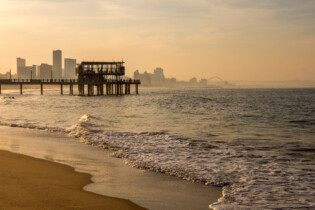The Event Greening Forum implemented a number of sustainable event practices at its recent Master Class and Conference, explains Zoe van Niekerk. Every time we host an event like the Event Greening Forum (EGF) 2018 Master Class and Conference, we treat it as an opportunity to showcase event greening measures. These events were no different…
Finding a venue that is committed to sustainability and is able to support our requests was critical to our event greening success. The forum company is an EGF member and was able to offer us the following:
- The venue had great natural lighting, so we had minimal lighting requirements during both events.
- The forum | white light has an on-site vegetable garden that supplies the kitchen with fresh, seasonal, organic produce. Any ingredients that are not home-grown are procured from within a 50 km radius, keeping the food miles to a minimum. Organic waste is composted and added back to the veggie gardens.
- The forum venues are seeking Healthy Venues accreditation. As a result, the catering emphasised healthy, nutritious choices. Jugs of water and bowls of fruit were placed on the tables, instead of bottled water and sweets. This also reduced our event waste.
- The food was served with reusable crockery and cutlery. The only exception was the Master Class lunch, which had biodegradable wooden cutlery. The Conference lunch was also served with linen napkins.
Other event greening practices we adopted include:
- We did not have conference bags, as these are not usually used beyond the day of the conference.
- In terms of stationary, we did not provide branded notepads but encouraged delegates to use their own notebooks. Eco-friendly pencils were offered to delegates, to take if they wanted them.
- We requested the conference lanyards be returned at the end of the event, so that we can reuse them at future events.
- All delegates were given gift vouchers, which they could spend on beautiful handcrafted items from African Mamas Crafts, a local company that works with rural based cooperative groups to source its goods and collaborate with them to help develop its products.
 Lastly, we are busy calculating the total travel-related carbon footprint of our delegates attending both events. Our online registration form asked each person where they were travelling from, which will give us a rough benchmark for the number of kilometres travelled to and from the venue each day. We will then identify a suitable carbon offset project through which we can do a partial offset of the events’ travel-related carbon footprint.
Lastly, we are busy calculating the total travel-related carbon footprint of our delegates attending both events. Our online registration form asked each person where they were travelling from, which will give us a rough benchmark for the number of kilometres travelled to and from the venue each day. We will then identify a suitable carbon offset project through which we can do a partial offset of the events’ travel-related carbon footprint.







